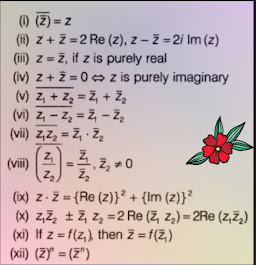properties of complex numbers:
some important consequences of the definition of addition (A1) and multiplication (M1) of complex numbers are as follows:
properties of addition defined by (A1):
A2: for all Z1 = (X1,Y1), Z2 =(X2,Y2), Z3=(X3,Y3) contain in R^2
(Z1 + Z2) + Z3 = Z1 + (Z2 + Z3) (ASSOCIATIVE LAW OF ADDITION)
HERE USING (A1), WE HAVE
- (Z1 + Z2) + Z3 = (X1 + X2, Y1 + Y2) + (X3 + Y3)
- = ( X1 + X2) + X3 , (Y1 + Y2) + Y3)
- = ( X1 + (X2 + X3), Y1 + ( Y2 + Y3) (Associative law in R)
- = ( X1, Y1) + ( X2 + X3, Y2 + Y3)
A3: There is a complex number 0 = (0, 0) belong to R^2 , called the additive identity,
Such that for all z = (x, y) belong to R^2 ,.....
0 + Z = Z + 0 = Z (Additive identity)
A4: for each Z = ( x, y) belong to R^2 , there is a - Z = (-x , -y) belong to r^2 is called additive inverse of Z, such that
- Z + (-Z) = (0, 0) = 0 ( Additive inverse)
- For all Z1 = ( X1, Y1) , Z2 = (X2, Y2) contain in R^2
- Z1 + Z2 = Z2 + Z2=1 (Commutative law of Assition)
HERE
- Z1 + Z2 = (X1 + X2, Y1 + Y2)
- = (X2 + X1, Y2 + Y1) (Commutative Law in R)
- = Z2 + Z1
The properties (A1 - A5) in R^2, under addtion, is an abelian group.







0 Comments